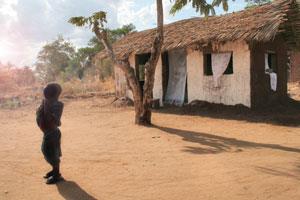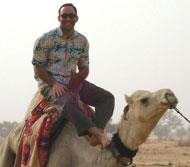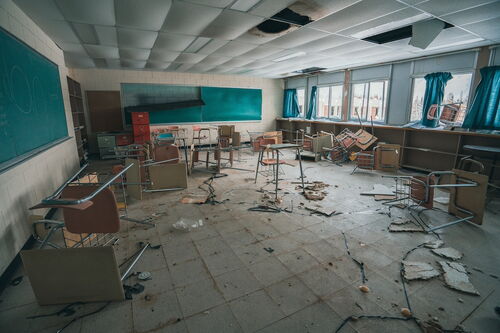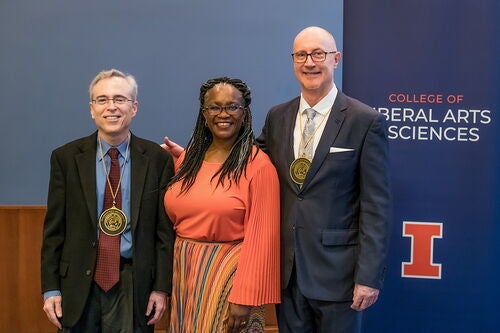Child Fostering

Richard Akresh, assistant professor of economics, returned from Burkina Faso with an unusual collection of "souvenirs." Six hundred pounds of paper, to be precise, which represents household survey data he collected over 18 months about social structure in that West African country.
Akresh was introduced to the region after working in Togo for two years in the mid-1990s as a Peace Corps volunteer. That experience led him to pursue a doctorate in economics at Yale University.
"I had a great experience and became interested in development issues," he says. "Yale has a long tradition of developmental economics and field work, which is what attracted me to the program."
During his stay in Togo, Akresh witnessed fostering-when families send a child to live with friends or relatives-firsthand and wondered about the outcomes for these children. That led him to propose a study of the practice for his doctoral thesis at Yale University.
Akresh was curious what the outcomes are, not only for the children fostered, but also for those left at home, and the families who take in the foster child. Most funding agencies and non-governmental organizations, such as Unicef and the International Labor Organization, take the position that fostering is typically bad for children, who, it is said, are often sent into abusive situations or forced to work grueling jobs. Non-governmental organizations (NGOs) have urged various African governments to adopt policies to reduce or prevent fostering.
Akresh suggests that this position is based primarily on anecdotes rather than data. His work gives a more nuanced understanding of the practice.

"No one would deny it; you could find the story of the child who was beaten, or the horrible situation of the child that works 18 hours a day," says Akresh. "They exist; they're not fiction. But the question was: Are they just anecdotes, or if you did some systematic survey, how do most kids end up? This was the systematic survey."
In 15 randomly selected villages within the province of Bazega in Burkina Faso, Akresh and his team surveyed 600 households in the initial phase. From this activity, there were then 300 foster children for whom the team tracked down the paired household. Akresh gathered information about the extended family of the respondents, which gave him information about options where the family could send a child.
"No other surveys exist that have this detailed information," says Akresh.
His survey also recorded information about economic shocks that households experienced-bad harvests, health shocks, unemployment, deaths, and so forth-and demographic information about the household.
The survey also included questions regarding fostered children between the ages of 5 and 15. Akresh found no cases of children being abused, even on cocoa plantations in the Ivory Coast, where NGOs were concerned the conditions were akin to slavery, or forced servitude.
"There are, no doubt, horror stories out there," says Akresh. "But one thing that needs to be taken into account is the situation the child is leaving. It might look harsh to work long hours at a cocoa plantation, but if you look at the home situation, you might find that this represents an improvement, not only for the child, but also for the entire family."
Akresh documented that those children being fostered were living with families who were better off than their birth families. Typically, for example, families who worked at the cocoa plantation had homes with tin roofs instead of straw, cement walls instead of mud, a refrigerator, and a television. These are "orders of magnitude better" conditions even with long work hours, says Akresh.
"In economics we try to think about, 'What is the counterfactual?' This child in Ivory Coast might be in a worse situation relative to other kids in Ivory Coast, but what would he or she have been doing if they had not been sent there? The relevant question is: What would this kid have been like if they'd stayed behind?"
By collecting data on both the senders and receivers, this is the kind of question Akresh is trying to answer.
"We know the kids who were left behind, so we can look at how those biological brothers and sisters did: Did they get schooling? How does their health look? It looks like the kids who are fostered actually do a lot better."
Akresh says without taking that counterfactual into account, people see only that a fostered child is perhaps a maid in a family or not being taken care of as well as the biological children in that home. And, he notes, in a perfect world, all children would be treated the same. However, what is truly relevant is that the fostered child's family was poor and the children were perhaps not getting enough to eat. Being fostered can be a "great step up." It also relieves some pressure on the poor family, Akresh notes, freeing up resources for those left behind.
Among other things, Akresh has looked directly at the impact of fostering on education opportunities. The worry among some is that families would pull a child from school and send her (typically it is girls) to a relative to work as a maid or nanny for that family. Akresh found that, in fact, that happened only 3 to 4 percent of the time. He also found that young foster children are 17.5 and 17.9 percent more likely to be enrolled after fostering than their host and biological siblings, respectively.
Akresh's findings are more consistent with the African perspective of fostering as a positive practice.
"If you talk to most Africans, most educated Africans will have been fostered," he says.
Akresh, who is broadly interested in children's welfare issues, is now working on a project looking at the impact of civil conflict on children's welfare, particularly their educational and health opportunities.
Read a related article on an LAS Course Abroad to Burkina Faso led by Akresh.








